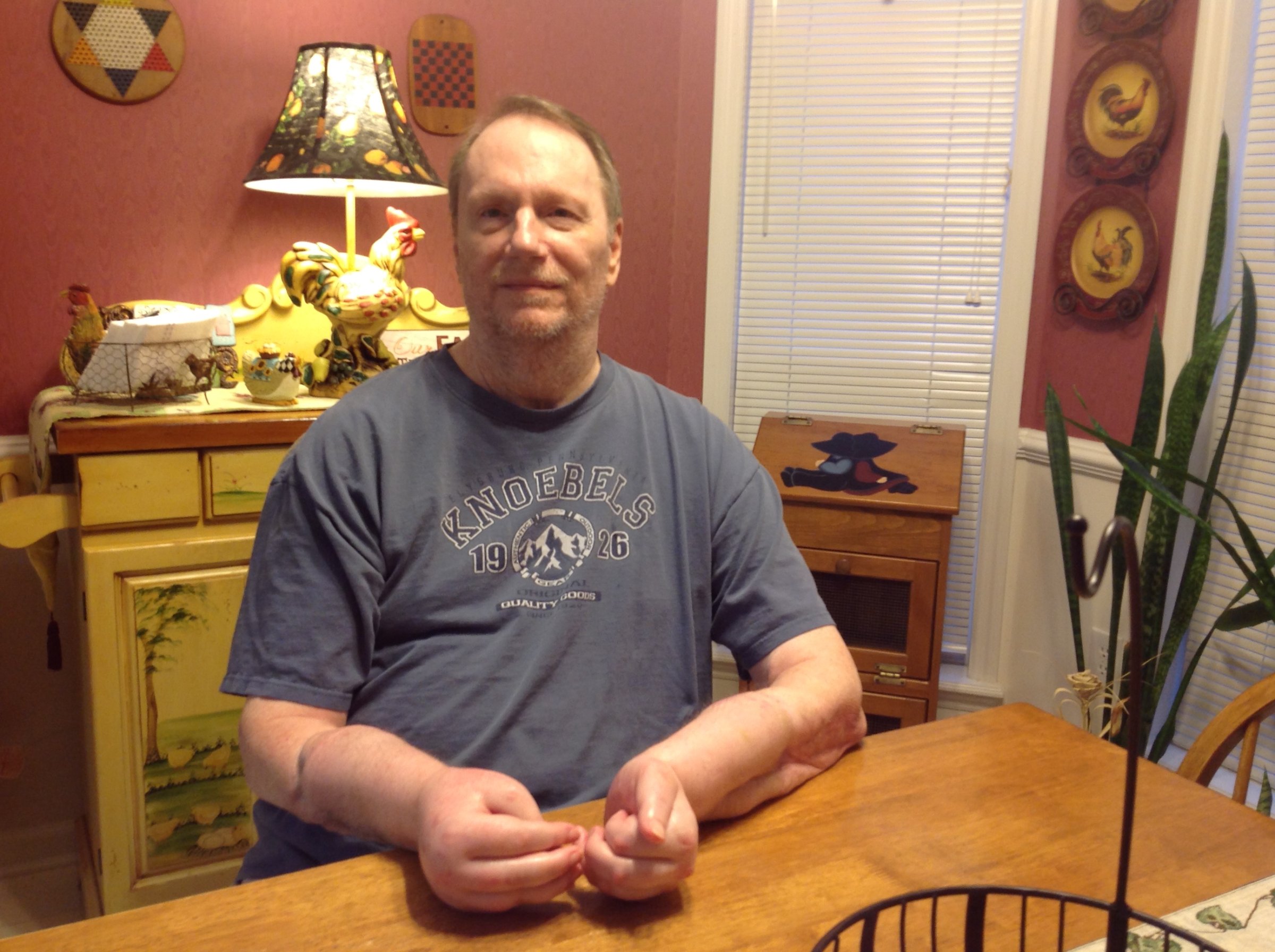
In medicine, someone always has to be first. Seven years ago, that person was Jeff Kepner, now 64, who became the first person to receive a double hand transplant in the United States.
The milestone made headlines: “A Touching Tale of a Life Changed,” read one from the Pittsburgh Post-Gazette. But Kepner’s transplanted hands have never worked, and today they remain completely non-functional. If he could, Kepner says he would have them removed, he tells TIME in an exclusive interview.
“From day one I have never been able to use my hands,” he says. “I can do absolutely nothing. I sit in my chair all day and wear my TV out.”
Kepner is one of many Americans who have undergone experimental transplant surgeries that do not save their lives, like a heart, but stand to greatly improve them. In the last few years, doctors have performed groundbreaking face transplants and the first uterus and penis transplants stateside. But Kepner’s story highlights the sacrifice that can come from taking a risk for a better life—and for scientific advancement.
In 1999, Kepner, of Augusta, Ga., lost his hands due to sepsis that started from a strep throat infection. He used prosthetics, and while life wasn’t easy, he was able to drive and keep a job—things that are impossible for him today.
Ten years after the infection, Kepner underwent a nine-hour surgery at the University of Pittsburgh Medical Center (UPMC) to attach hands from a donor. Kepner knew there was a risk that his body could reject the hands or that the surgery wouldn’t be successful, but he had always assumed, and says he was told, that in a worst-case scenario he could have the new hands removed and go back to using prosthetics. He’s since learned that that option isn’t so simple.
Dr. Vijay Gorantla, the administrative medical director of the Pittsburgh Reconstructive Transplant Program at UPMC, is overseeing Kepner and tells TIME that full or partial removal of the hands has been discussed, but the procedures are not without risks. According to Gorantla, it’s uncertain if Kepner would be able to use prosthetics if the hands were removed, and that rigorous physical therapy would be required.
If the hands were to be only partially amputated, Kepner would need to stay on daily drugs that prevent his body from rejecting the hands, wrote Gorantla in an email, adding that: “We believe that additional, minor surgical procedures—and commitment to more physical therapy—could improve the function of his hands to help him with activities of daily living.”
Kepner says that after seven years, he’s tired of surgeries, and will likely keep the non-functioning hands attached to his body. “I am not going through all those operations again,” he says.
The surgeon who led the transplant in 2009, Dr. W.P. Andrew Lee, is currently at Johns Hopkins where he’s preparing to perform penis transplants for American veterans. Lee says the need for removal is uncommon and has occurred in six out of 100 similar transplants in the U.S. and Europe.
“Mr. Kepner’s transplanted hands do not function as well as those of other hand transplant recipients,” said Lee in an email to TIME. “Our team has performed bilateral hand/arm transplants in four patients to date, including Mr. Kepner. The other three patients have had significant functional return in their hands and have been able to resume completely independent living, including driving, working, and going to school.”
“Complex surgery such as hand transplant do not produce uniform results in everyone,” Lee adds, “but we have been encouraged by the functional return in the great majority of our recipients whose lives have been transformed by the procedure.”
Kepner says he hasn’t heard from Lee or any of the surgeons involved in the initial operation in years.
He says his diminished quality of life has taken a toll. With prosthetics, Kepner says he was 75% functional, but today he says he feels “0%” functional. His wife, Valarie, retired in May to take care of him full-time, and the Kepner family launched a GoFundMe page to cover costs they’ve incurred through the years. .
Kepner says that in hindsight he would not do the surgery again, but he does not criticize the doctors who did the operation. “That’s the chance you take,” he says, “and that’s the chance I took.”
More Must-Reads from TIME
- Why Trump’s Message Worked on Latino Men
- What Trump’s Win Could Mean for Housing
- The 100 Must-Read Books of 2024
- Sleep Doctors Share the 1 Tip That’s Changed Their Lives
- Column: Let’s Bring Back Romance
- What It’s Like to Have Long COVID As a Kid
- FX’s Say Nothing Is the Must-Watch Political Thriller of 2024
- Merle Bombardieri Is Helping People Make the Baby Decision
Contact us at letters@time.com